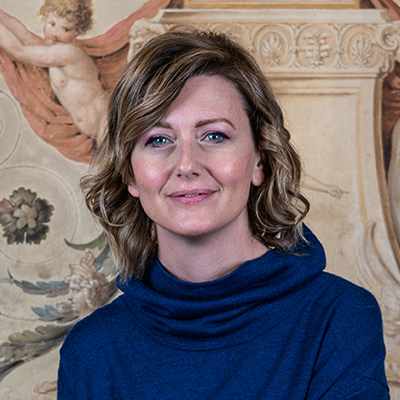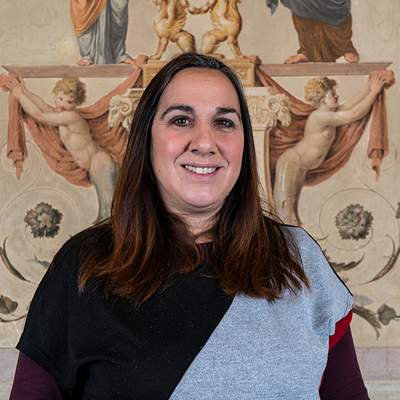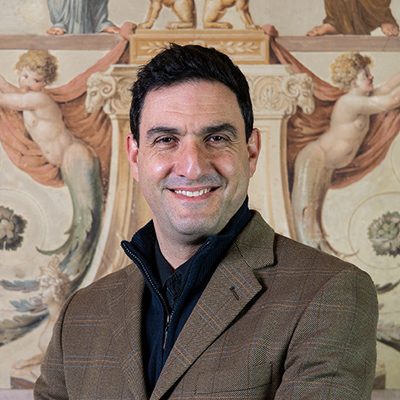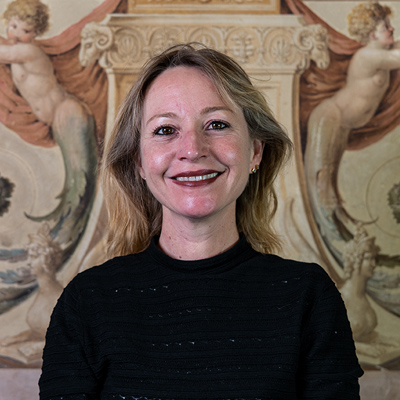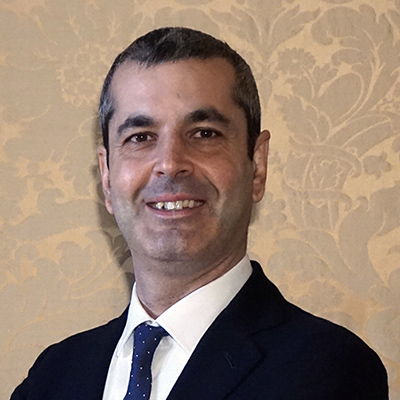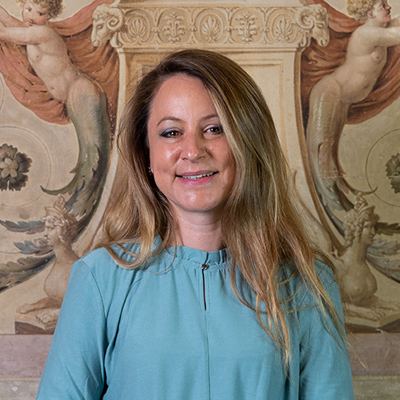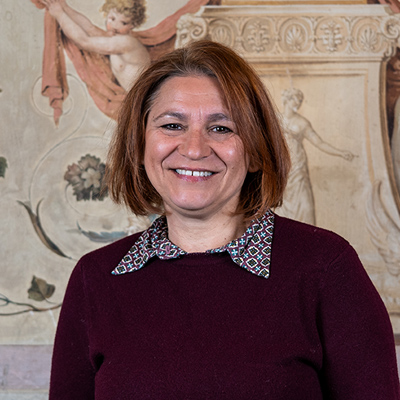Faculty in Rome Teaching in Rome
Faculty in Rome
The Rome Center is fortunate to count amongst its staff and adjunct faculty, professionals from diverse fields such as: Fashion Design and Costuming, Architecture, Management and Art. Our staff and faculty members are chosen for what they bring to the classroom and the lives of the students. They possess the ability to bring Roman history, architecture, and culture to life in the classroom. They also provide needed support for our students engaging in the study abroad experience.
Developing a Short-Term Faculty Led Study Abroad Program
Guidelines for Faculty Teaching in Rome
Approved by the Rome Center Advisory Committee and International Education Advisory Council January 2019
The University of Arkansas Rome Center (UARC) is administered by the Graduate School and International Education (GSIE). The Rome Campus has NO central administrative funding and functionally operates as an auxiliary unit with all financial resources derived from participating student fees. Program offerings consist of an expanding standing catalog of courses and focused ‘programs of study’ developed and offered periodically by U of A campus faculty to supplement the standing curriculum in Rome.
The following guidelines have been established for University of Arkansas faculty proposing to teach courses at the UA Rome Center. This document has been approved by the International Education Advisory Council (IEAC), Rome Center Academic Advisory Committee and endorsed by the individual colleges/schools.
U of A Faculty Proposal Deadline
Proposals to teach in Rome are due APRIL 1 (for the next calendar year and beyond)
Proposals submitted by April 1, 2019 will be considered for teaching during May/Summer 2020, Fall 2020 and Spring 2021. This cycle will repeat annually.
Initial Considerations
Faculty should first
- Consider their area(s) of academic expertise and knowledge of Rome, Italy, and the region to be able to create and justify an attractive study abroad offering;
- Consider what year and term (spring or fall semester, May intersession, summer sessions) they would want to teach (need 18-36 months lead-time);
- Consider the time needed to recruit, mentor and prepare students prior to departure. Much responsibility falls to faculty to engage and recruit a minimum number of students for their course offering.
- Discuss plans to propose the courses with their department chair/head to determine if it is supported and would be approved by the department.
- Determine if their college has its own internal guidelines for proposing faculty taught courses in Rome and understand that process and timeline;
- Meet with the Rome coordinator in the Office of Study Abroad and International Exchange (STAB) to address any additional questions.
Course Program Models
UARC will maintain a set of courses for general studies to be taught by Rome Center Faculty (mostly core and electives) during the fall, spring and summer terms. U of A Campus faculty are invited to propose two to three upper-level courses for the semester or one to two courses for the summer that will attract a minimum cohort (12 to 15) of students to support the course offering. Students typically enroll in a combination of courses taught by U of A campus faculty and UARC faculty to attain full-time enrollment.
Teaching may occur in one of three session formats
May Intersession teaching assignment
The typical teaching assignment for the May intersession is one, 3-credit course. The summer session teaching assignment at the Rome Center closely resembles a faculty-led study abroad experience and includes increased student-faculty interaction.
Summer 5-week session teaching assignment
The typical teaching assignment for a summer session is two, 3-credit courses. The summer session teaching assignment at the Rome Center closely resembles a faculty-led study abroad experience and includes increased student-faculty interaction. Historically, the first summer session constitutes an 'open campus' program where students enroll in 6 credit hours taught by a variety of visiting faculty & Rome Center resident faculty. Proposals in this term may include one or two classes to be taught together (in a 'block') or separately (meaning, students would take one of your classes and one class taught by another faculty member). Each course will have to meet the minimum enrollment set forth by the college.
Semester teaching assignment
The typical teaching assignment expectation is two, 3-credit courses. Faculty teaching in Rome would also be expected to fulfill other work expectations of their normal assignment including their normal expected scholarship (research or creative activity), maintaining regular office hours, supporting the activities of the department, and participating as an active faculty member with the Rome Center faculty.
Academic Expectations
Teaching at the UA Rome Campus is fundamentally different than teaching at the UA campus and requires more faculty preparation and involvement. It requires the faculty to be more self-sustaining, flexible, available and resilient.
The “Rome Center Program Proposal,” is located in the Office of Study Abroad’s “Hogs Abroad” portal and will require the faculty leaders to submit course syllabi and to articulate overall learning objectives and outcomes of the proposed courses.
Faculty Led Program Development Information and Application
The learning outcomes must incorporate proposed additional class travel or excursions with a suggested itinerary, to be confirmed with the Rome Center Director, specifically connecting the lectures, excursions, and cultural activities to those outcomes. The faculty’s sponsoring department or college may have additional criteria for evaluating the appropriateness of the courses and overall program proposal in meeting the department, program, or college’s priorities. Faculty are expected to participate in field excursions that are scheduled for students.
Faculty Assignment at the U of A Rome Center
A UA campus faculty teaching at the Rome Campus is approved by way of a joint agreement between the campus department/college and the Rome Campus.
- Student credit hours for all instruction in Rome are assigned to academic units on campus even when they are taught by Rome faculty. The assigned location is the U of A Rome Campus, not the UA FAY campus.
- The primary beneficiaries are the students and the program reputation of the Department/College.
- A secondary benefit to the U of A campus faculty being in Rome is for their scholarship and/or other relief of normal campus duties (committee assignments, etc.). This is a joint activity – the primary benefit is to the Department.
- Salary for U of A faculty teaching for the semester is paid for by the home department/college. It is not the responsibility of the U of A Rome Campus.
- This is the assigned teaching responsibility for that faculty member.
- The Rome Campus, GSIE or Study Abroad are not responsible for replacement teaching faculty to cover any U of A on-campus responsibilities of the faculty while they are assigned to teach at the Rome campus.
- Any “fill” faculty/instructors are the responsibility of the Department/College of that faculty member.
- For semester classes, no additional compensation is provided as teaching is considered assigned teaching workload.
For intersession and summer sessions, compensation is provided by the college’s summer school salary and is approved with the understanding that the minimum enrollment and projected tuition will cover the anticipated salary.
- For every 3-credit hour intersession or summer session course, the named instructor of record, assuming a 9-month appointment, is provided 7.5% of his/her annual salary + benefits.
- Faculty or staff on 12-month appointments do not receive extra compensation for teaching at the Rome Center during an intersession or summer session and this should be considered part of the assigned work load responsibility.
- Direct travel costs and living expenses approved expenses for U of A faculty are prorated into student program fees.
- For Intersession/summer teaching - Costs to be covered include round-trip airfare; mileage to/from and parking at XNA, lodging (single accommodation); meals (up to $60 per day), in-country transportation and additional expenses for planned class excursions.
Housing is provided in reasonable proximity to the Rome Campus for that faculty member for the duration of the teaching assignment. Housing is paid for by the student fees.
This does not include any family, partners, or friends.
Housing is provided only for the duration of the courses/program being taught.
There may be income tax implications for the U of A campus faculty depending upon domestic housing situation.
The Rome Campus provides an Italian cellphone for local use only – not international use.
The Rome Center sponsors several events with food including welcome reception, a picnic and faculty dinners.
Faculty costs NOT covered include passport; vaccinations and medications required or recommended; daily meal expenses during the semester, local transportation in Rome, any personal or nonteaching related travel, and any personal expenses not required to meet expectations of the courses.
Enrollment and Recruiting
Faculty play a large role in recruiting students. Typically, enrollment below 12 students per class is subject to cancellation, unless otherwise negotiated with the department/unit chair and appropriate Dean’s office.
It is expected that a proposed faculty program will recruit a minimum of 12 students to justify a course offering and cover the faculty’s travel/living expenses.
If fewer than the minimum of 12 are enrolled, then an additional agreement with department/unit leader and dean must be made.
For a program to operate while under-enrolled, the department/unit/college must agree to subsidize any expenses incurred on behalf of the faculty which are not covered by student fees. This includes the transportation and housing that is provided to the faculty (see below).
These agreements should be made in-advance of a decision for the course to proceed and be made with a written agreement. Otherwise, the courses/program cannot be offered without the Rome Center incurring significant debts.
Program Fees
The program fees for the Rome Center are U of A System Board approved fees and are determined in order to cover the costs of instruction, travel and accommodations for the teaching faculty, planned excursions, and other courses and programs for students.
Additional Considerations
- UA campus faculty teaching at the Rome Campus are expected to follow all policies and procedures of the U of A campus and those expressed in the U of A Faculty Handbook.
- Instructors should meet with the assigned classes at the assigned times and locations.
- Instructors should post and keep regular weekly office hours at the Rome Campus to meet with students.
- Faculty are expected to participate with the Rome Campus faculty in academic meetings and committees.
- The Rome Campus has a very small administrative staff and their ability to assist with instruction (such as photocopying) or other personal requests for assistance may be limited.
Faculty Timeline for Proposing Courses in Rome
Semester Programs
24-36 months out from the term you would lead a program:
- Review all guidelines provided by GSIE and college for teaching at the UA Rome Center.
- Attend seminar on “Developing a Faculty led Study Abroad Program” (offered once each semester by Office of Study Abroad.)
- Discuss your interest in offering a study abroad program with your Department Head.
- Meet with Office of Study Abroad (STAB).
- Draft tentative program concept to share with the Rome Center Academic Coordinator and Director
April 1
Deadline for Rome Center Proposal to teach in the academic year starting a year from the next fall. (Example: proposals received by April 1, 2019 would be for courses to be offered Fall 2020, or Spring 2021)
May/June
Work with STAB on promotional materials to be distributed at Freshman Summer Orientation sessions; communicate with college advisors about courses that will be available in Rome.
July
Provide text and photos to Office of Study Abroad for program webpage to begin student recruitment in the early Fall.
September
- Participate in the annual Study Abroad Fair to promote the class(es).
- Attend faculty seminar on “Student Recruitment and Selection for a Faculty-Led Study Abroad Program”.
September –
up until student application deadline:
For Fall program
February 1 -
Student application deadline for the following Fall semester
March -
- Enrollment for the following Fall confirmed
- Fall faculty travel arrangements are made and visa application is started
- Pre-Departure orientation meetings with students
For Spring program
September -
Student application deadline for the following Fall semester
October -
- Enrollment for the spring is confirmed
- Fall faculty travel arrangements are made and visa application is started
- Pre-Departure orientation meetings with students
May Intersession/Summer Programs
18-24 months out from the term you would lead a program
- Review all Guidelines.
- Attend seminar on “Developing a Faculty led Study Abroad Program” (offered once each semester by Office of Study Abroad.
- Discuss your interest in offering a study abroad program with your Department Head.
- Make yourself aware of all college procedures, funding opportunities and related college deadlines for faculty who want to develop a short-term study abroad program.
- Develop a program concept (what, why, where, when).
- Meet with Office of Study Abroad (STAB).
- Draft tentative program itinerary to share with the Rome Center Academic Coordinator.
April 1
Deadline for Rome Center Proposal to teach in the following calendar year
May/June
Work with STAB on promotional materials to be distributed at Freshman Summer Orientation sessions. Communicate with college advisors about Rome course offerings.
July
Provide text and photos to Office of Study Abroad for program webpage to begin student recruitment in the early Fall.
September
- Participate in the annual Study Abroad Fair.
- Attend faculty seminar on “Student Recruitment and Selection for a Faculty-Led Study Abroad Program.”
September – January
Recruit students through info. meetings, class visitations, and individual meetings with prospective students.
February 1
- Confirm Enrollment and review salary compensation with college dean.
- Work with STAB to secure travel arrangements (i.e. airlines, visas, payments for vendors)
March- April
Pre-Departure meetings and class registration
May/June
Program Departures
Checklist for Faculty Teaching in Rome
Student Recruitment
- Attend faculty seminar on “Student Recruitment and Selection for a Faculty-Led Study Abroad Program.”
- Prepare short program description(s) and identify photos that can be used for marketing purposes and the program webpage on the STAB website.
- Confirm eligibility criteria for students
- Participate in the annual Study Abroad Fair.
- Hold student promotional information sessions about your courses.
- Arrange for class visits to promote your course(s).
- Link departmental website to program’s webpage and Rome Center website.
- Work with department to promote and share program information and application information through social media, student listservs and other channels.
- Meet with prospective students to answer questions or concerns.
- Review completed student applications in HogsAbroad web-portal to accept, deny or waitlist.
Pre-Departure
- Confirm enrollment (signed payment agreements) with Office of Study Abroad (STAB).
- Secure salary compensation with dept. head and college dean’s office.
- Work with Office of Study Abroad to secure travel arrangements with designated travel agent and visa process (if applicable)
- Review country information (travel.state.gov), visa requirements, and all recommendations from the Center for Disease Control (cdc.gov)
- Meet with confirmed participants to provide program overview, discuss course expectations, review itinerary, and answer questions.
- Remind departmental administrator to include you in the Summer Workload (or Intersession)
- Review STAB Emergency Response Plan for faculty-led programs;
- For summer teaching: Finalize agreement with STAB office on cash advance needed for group funds and personal meals.
- Review procedures for filing a Travel Expenditure Report upon return.
- Hold mandatory pre-departure orientation for participants with STAB.
- Review class rosters to ensure that students are properly registered.
- Engage students through email or messaging to provide periodic updates. Faculty should facilitate direct communication with student participants to share information, answer questions, and maintain open communication channels.
